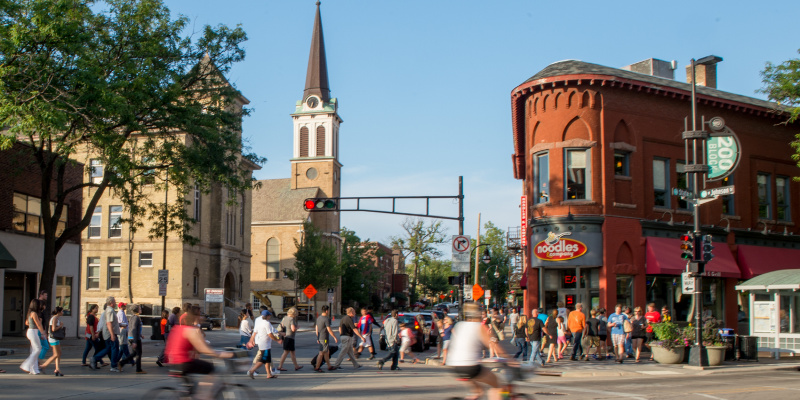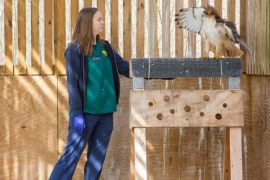Image credit: Image courtesy of Focal Flame Photography, via Destination Madison
Although travel is probably the last thing on your mind right now (or maybe not?), it’s always the first thing on Destination Madison’s mind as the city’s travel and tourism promotion engine. Tourism generates $1.3 billion a year in direct visitor spending in Dane County and 22,000 people work in the industry. (Destination Madison’s website even notes that “In the absence of state and local taxes generated by tourism, each Dane County household would need to pay $730 to cover to maintain the current level of government services.”) There’s no doubt that the coronavirus pandemic has greatly affected the travel industry (read this article for more)—but how will it affect Madison’s small businesses, restaurants and hotels moving forward?
We talked to Deb Archer, CEO of Destination Madison, to get her take on the situation.
What has Destination Madison’s role been during the coronavirus crisis?
We knew our revenues would be falling, because we rely on the tax that’s charged in the hotels from a visitor perspective. So, we had to first make sure we could stabilize [our] organization because we know we’re going to be needed when things open up again. So immediately, we did a lot of cost containment—we eliminated positions, we furloughed people, everybody on staff had some sort of pay cut or furlough, and everyone on staff is sharing the pain. And we cut off all current marketing programs, staff travel, et cetera, for the foreseeable future. Because we wanted to reserve the revenues we do have because we know there’s going to come a day when we have to be ready to rock and roll again.
The second thing we did was immediately figure out what resources the businesses in our community need to understand how they can survive through this. So we become a resource hub for information on relief funds, loans and grants, and then we also wanted to make sure we could do anything we could to help the [hospitality] workers that would be losing their jobs. When this first happened, we didn’t know what sort of federal and state relief would be available for furloughed and laid-off workers. So we contacted the United Way and all of the service agencies to find out [if we] should we start our own fundraiser for the industry, or [if there] were already initiatives that had funds and proceeds in place to support the workers. And there were plenty of agencies that were set up for that.
Then the other piece we did for our partners was field all the calls for cancellations of events and do everything we could to rebook the business as quickly as possible. That was also really important to our sales team that we dug into really fast—and we’re still working on fielding cancellations. Now [eight weeks in] we’re in the mitigation phase of, how do we minimize these losses, and we’re starting to talk about strategy for reopening. And it will be a process—it won’t be a flipped switch—it’ll be a process.
What’s your assessment of how Madison’s small businesses, restaurants, hotels and venues will fare after this?
Well, the conversations we’ve had is that our hope is that the Paycheck Protection Program and the CARES Act and other federal programs and statewide programs will help a lot of these business stay on their feet. For a lot of the businesses, it will be a process in reopening. Their business won’t look the same—maybe ever. I don’t mean to be dramatic about that, but a lot of their models will change. We had a conversation with a restaurateur this morning who didn’t used to do a lot of carryout, but now they see people really like carryout and will do it. So, should they add that to their model—to be more engaged in carryout?
The other part of [this] is that [businesses] may not hire as many people back, so how do they operate a little more efficiently initially? Because [due to capacity restrictions in] restaurants, they won’t be filling the restaurant, or retailer, or accommodations … so the workforce they will be hiring back will look different.
It will be survival, and there will be businesses that unfortunately the longer this goes on, the more difficult it will get. The [restaurateur] we talked to this morning [also] said [that we have a] population that really loves and supports our restaurants. Now, what we don’t know about that is we have a lot of people out of work—so not everyone will be able to support the restaurants the way they maybe did in the past. That’s where I think these models will change and build on [a] takeout business with a reduced menu, and maybe that’ll help people to be able to continue to support restaurants because they can do more affordable takeout.
Obviously, it’s not just businesses that are affected by this—concerts, gatherings, conventions and events (which are a huge part of what you promote)—will also have to potentially retool what they do.
With event planners, [they will have to think about] how can they move some of their events to a virtual platform? [Take Overture as a hypothetical example]—if they can only have half the capacity [at a show], can you live-stream a Broadway show that somebody would pay for? Particularly for someone who, until they find a vaccine for this, doesn’t want to leave their home. I think we’re going to see some fascinating models come out of this pandemic.
This week is National Travel and Tourism Week (May 3-9, 2020) and Destination Madison is promoting their Stay Home Love Madison campaign.
We wanted to continue to drive the message home about what a great place this is. A lot of the initiative is about things you brought up: businesses offering virtual experiences, like a virtual Bitters Boot Camp from the Avenue Club, or wine tastings or virtual trips to the zoo so when people are home, they can enjoy the things to do in Madison. And when things open, we can pivot and people will be able to do them in person.
Moving forward, how will this pandemic affect travel trends?
So what forecasters are telling us, and for the hotel industry this is pretty grim, is that it’s nine times worse than after 9/11. Now, 9/11 had a very V-shaped curve—things came back pretty quickly. This is going to be a slower slog and there will be some ripples in there if there are [disease] reoccurrences. It’s going to be a real rebuilding process.
For the travel industry, the first thing everyone thinks will come back will be regional travel, where people will just want to get out and enjoy their surroundings in neighboring communities and states, but not venture terribly far—so that’s where we’re focusing. That’s why [our] Stay Home Love Madison message is about what a great place this is to our regional audience, because that will be the first audience that comes back.
At the same time, companies and associations that have had to cancel their events will want to be rescheduling and planning new events because their members, companies and their people will want to get together. Now, there is no doubt in our minds that there will be more virtual components to events … because people have determined that you can function virtually. But, surveys still say that people want to see each other.
It’s going to be a long haul. But our industry will come back, because someone said in a meeting this morning that we’re a country of adventurers, and people have been afraid, but once a vaccine gets done, and things return to where people are not as afraid, people will start venturing out again.
What are you looking forward to once Madison businesses fully reopen again?
Having a brat at the Memorial Union Terrace. And I love to go down State Street and go in the shops, like Little Luxuries.




